Thomas Jefferson Would Not Approve
Monticello Replica, Somers
Before we get going, let’s get some background on Thomas Jefferson from Monticello.org. The real Monticello.

While Jefferson was a firm theist, the God in which he believed was not the traditional Christian divinity. Jefferson rejected the notion of the Trinity and Jesus’ divinity. He rejected Biblical miracles, the resurrection, the atonement, and original sin (believing that God could not fault or condemn all humanity for the sins of others, a gross injustice).[10] In neither the eighteenth century nor today would most people consider a person with those views a “Christian.”
Just keep that in mind as we wind our way through this bonkers story of Fribbles, a centenarian, threatened lawsuits, wonky real estate deals, small town politics, and a kooky college. It’s a long story and quite frankly, since I haven’t actually visited Fake Monticello in Somers, I have to rely heavily on source material. The best, by far, is an article that ran in Connecticut Magazine by Christopher Hoffman in 2020.
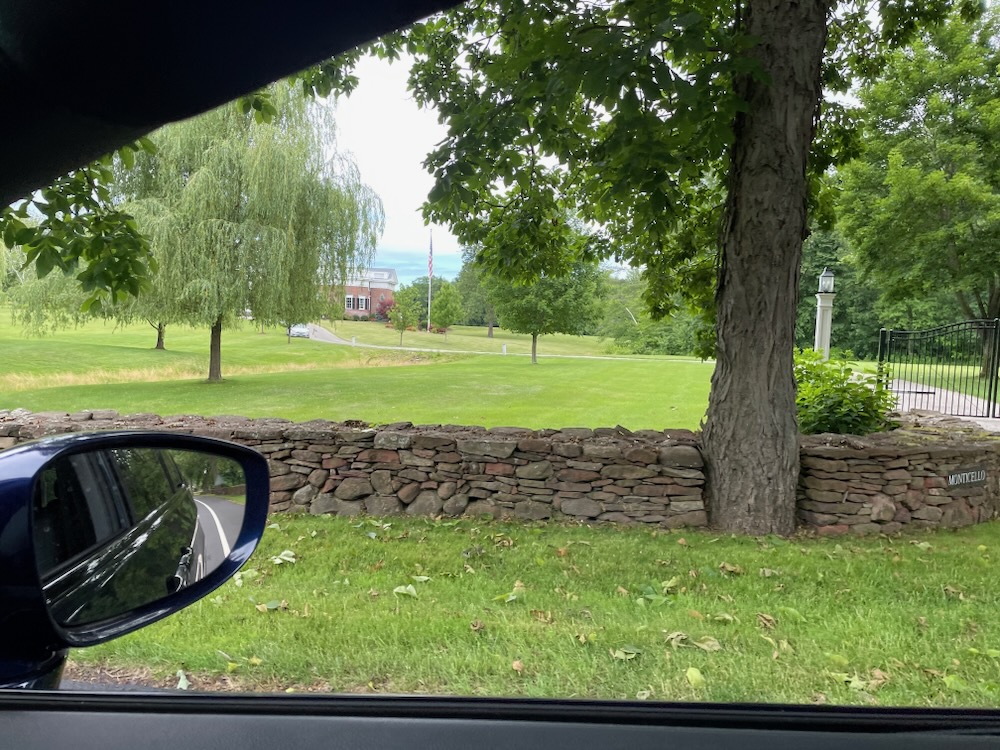
My attempt at a photo
The home in Somers, which was never actually lived in as a home as far as I know, was built by S. Prestley Blake to celebrate his 100th birthday. Blake was the co-founder of Friendly’s Ice Cream Company and he and his brother Curtis, who also lived past 100, were fairly legendary around the Springfield, MA area.
Friendly’s was founded in 1935, at the height of the Great Depression, by the brothers in Springfield. The Blake brothers opened a small ice cream shop named “Friendly”, selling double-dip cones for 5 cents each. In 1940, a second Friendly in West Springfield was opened with an expanded food menu. By 1951, 10 Friendlys were operating in Connecticut and western Massachusetts and it continued to grow into the 1990’s. Everyone from Connecticut has been to a Friendly’s. (Not being from here, I never really had until fairly recently. I had my first Fribble in 2023 in Weymouth, MA. It was alright.)
The Blake brothers retired and sold Friendly’s to Hershey Foods Corporation in 1979 and I guess they made out alright. But over the last few decades, the company has declared bankruptcy a couple times, it has closed tons of stores from Delaware to Massachusetts. As of October 2023, there were still over 100 restaurants though, which is a lot more than you thought probably. I’m sure the company will be kaput before this website is, however.
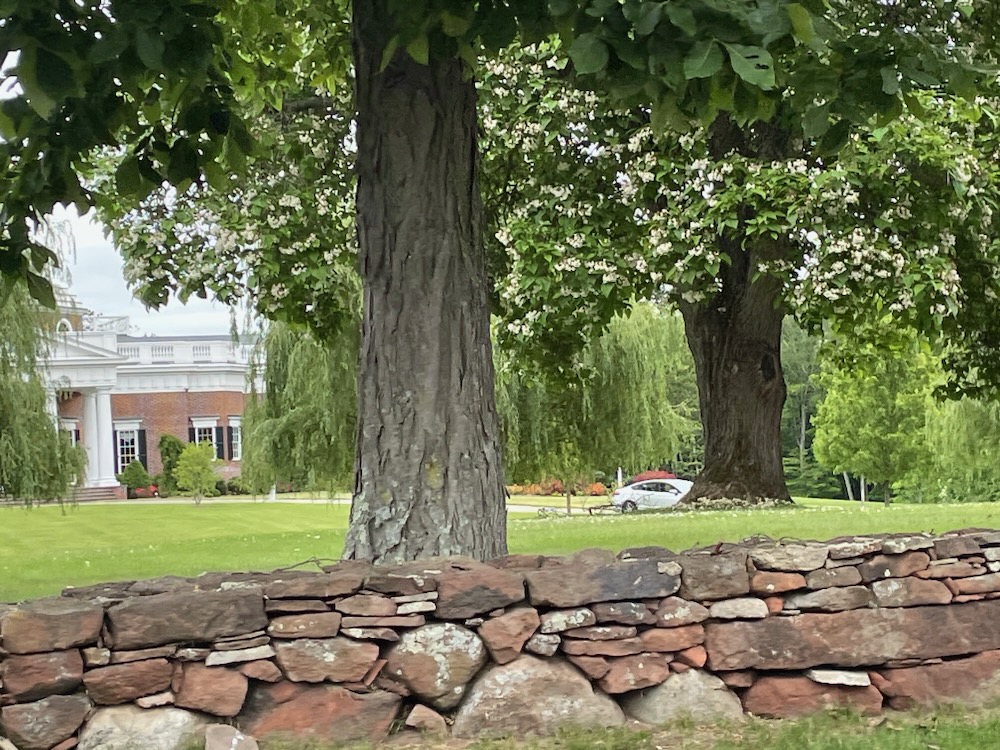
My photo
In retirement, Prestley did some good things with his money. And I’m sure there was much more than what Wiki tells me: The S. Prestley Blake Law Center is the home of Western New England University’s School of Law (he had donated $250,000 for it in 1979). The Blake Student Center at Northfield Mount Hermon School is also named after him. He donated $2 million to Springfield College in 2006 and had Wilbraham Hall renamed as Herbert P. Blake Hall in honor of his father. Good stuff.
As he approached his 100th birthday, I guess he got antsy. The dude wanted his own Monticello.
He had the replica built because he has always appreciated fine architecture and loved the incredible Monticello itself. The project was completed in November of 2014, in time for Mr. Blake’s 100th birthday. If you are unaware, Monticello in Charlottesville, Virginia is the 18th century home of Thomas Jefferson, our nation’s third president. Blake chose Western Massachusetts-based Laplante Construction to build the approximately 10,000 square foot home. There was no architect involved in the recreation as Ray and Bill Laplante, Founder and President of Laplante Construction, created the design specifications. And, shout out to the Laplante’s who say on their website that “the media” has access to their photos.
I’m media, right? Thanks for the photos. Here’s a five minute video about the project.
I tried to get my own, driving up Half Hill Road to the Massachusetts border a couple times in an effort to get close. As you can imagine, you can’t really get close to it. And it really is at the border:
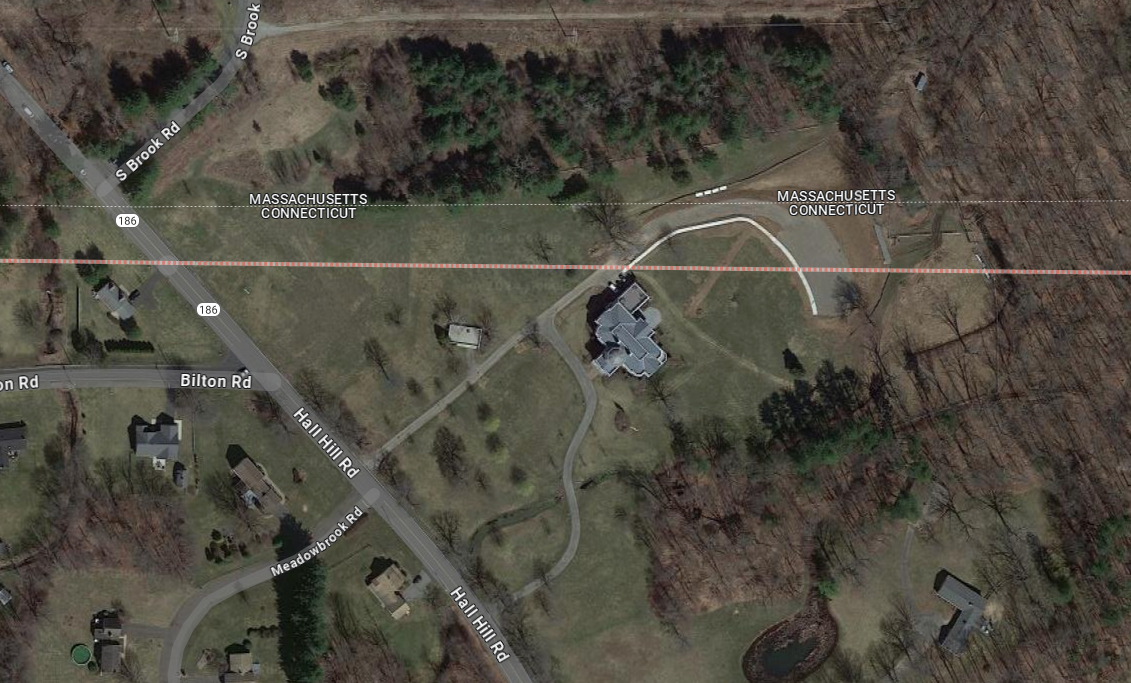
I think we can all admit this whole idea was a little bit kooky. But all reports suggest that Mr. Blake was of sound mind when he got this project rolling. The building is a “modernized replica” meaning that it is architecturally and historically correct on the facade, and yet the interior contains all of the latest modern amenities that someone would want in a luxury home. The footprint of the home is the same as the original Monticello with the exception of a 3-car garage added to the back of the home. The design of Jefferson’s famous dome was replicated, however the main entry way has been redesigned with a new foyer and double circle staircase. Heck, I read they had bricks made by hand by the same people who create them for Colonial Williamsburg. Laplante did an incredible job and the building certainly is beautiful.
But here’s the thing. Blake never lived in it. Rather, he lived next door; his plan was always to sell it to a worthy owner. He claimed it was “a gift to the community.” I’m not sure Somers ever asked for a replica of Monticello along a rarely traveled backroad to East Longmeadow, MA, but… okay.
I believe it was first listed for sale upon completion at $6.5 million. Then it dropped to $4.9 million. No bites. There was a great quote from the listing agent in 2014: “If you could pick this house up and put it in Greenwich or in Westchester (County, New York), it would already have been sold,” Hoyt said. “There just is not that much interest in luxury estates in Somers.”
Well, yeah. Duh. (Note: There are, actually, a surprising number of luxury estates in Somers.)
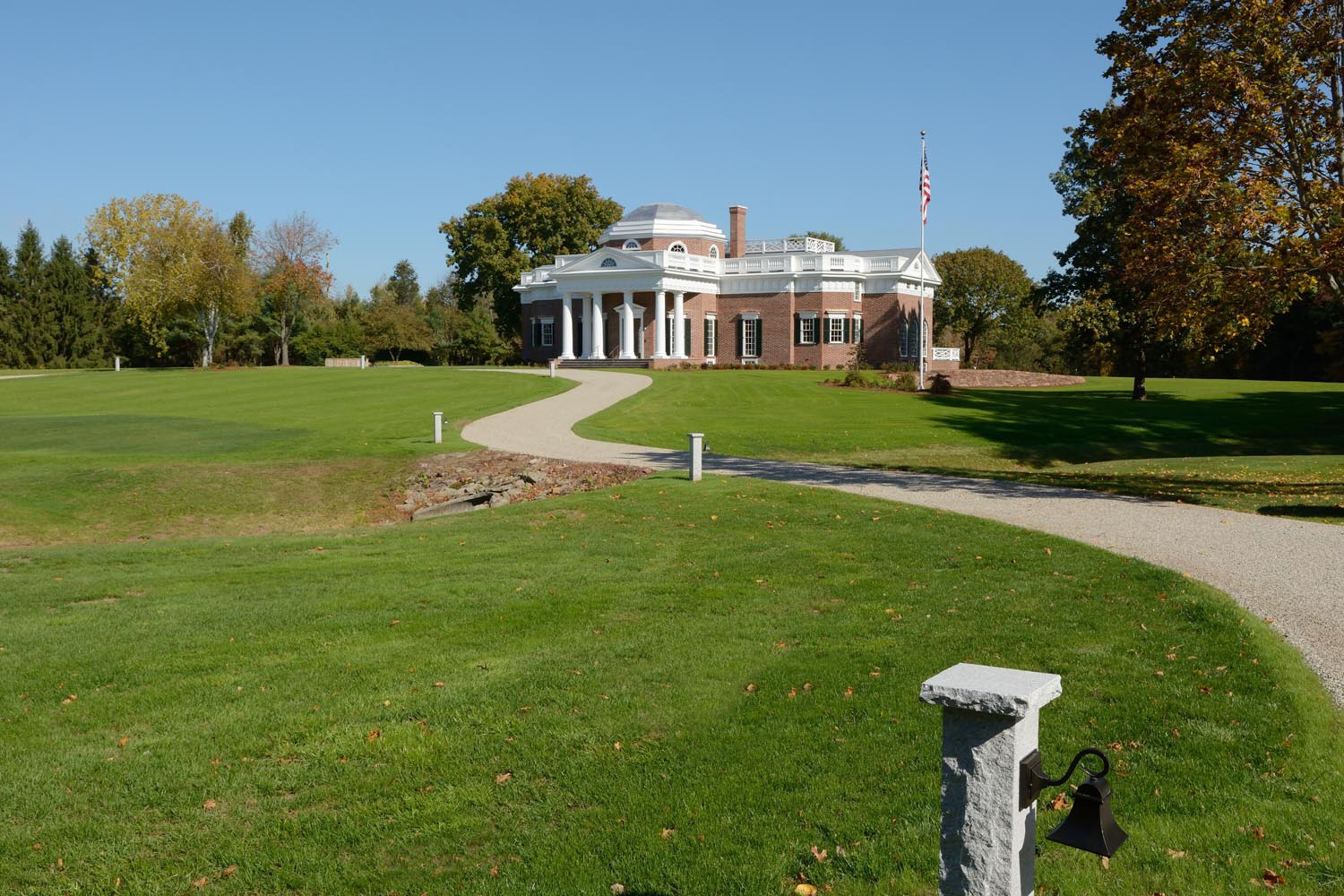
There were open houses – true open houses for the great unwashed like you and me to tour the home. I’m mad I didn’t know about them back then. Anyway, there were no serious buyers at the list price, so the unusual decision was made to move it to auction.
That didn’t work in 2015.
So they tried again in 2016. And it sold! For… $2.1 million. A 75% loss on the original cost to build! Maybe Mr. Blake should have had some slaves help out like Jefferson did – his Monticello cost $1.3 million when adjusted for inflation.
So, yeah, some doctor from Longmeadow bought it and planned to move into it in 2016…
… which never happened. There’s a hole here in the timeline I’ve pieced together. But what I think happened is that the Blake said, “nah, fam, no one’s getting my awesome MontyHallcello for two mill.” So the property sat for another couple years.
In the meantime, Blake moved to Florida. Hey, did you know that at one time on that same patch of northern Somers land the families that founded the Big Y supermarket chain and the Breck hair care company once had estates there? I guess it’s cheaper to live in Somers than in Massachusetts mere meters away. Anyway, this is where the story gets interesting.
No, really! I know you’re thinking it’s pretty darn interesting already, but it does get better.
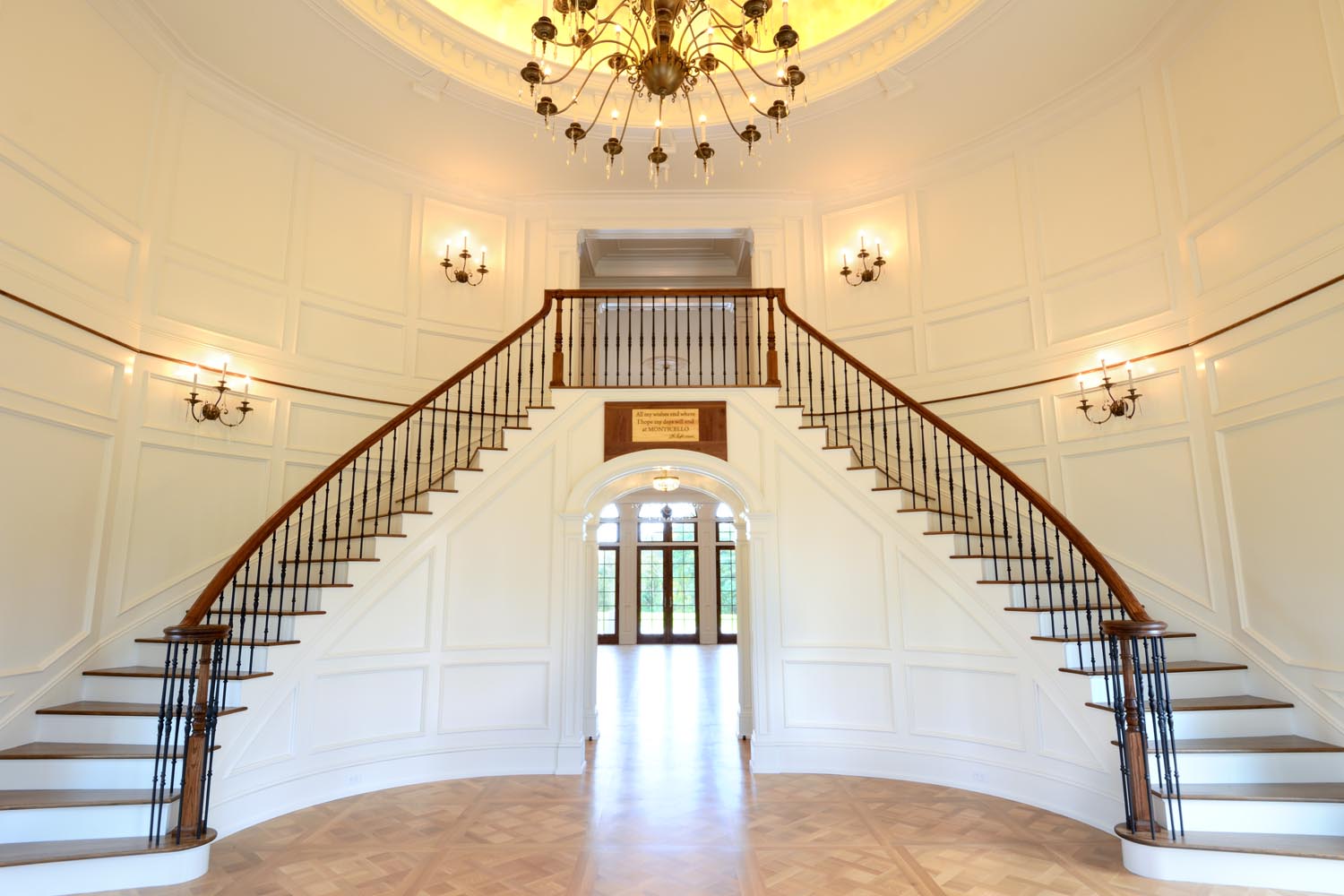
The plaque says, “I am as happy no where else and in no other society, and all my wishes end, where I hope my days will end, at Monticello.”
Remember how Blake was living next door to Fake-icello? When he moved Florida, he decided he’d donate his property. All of his Somers property. Including Montijello. (Again, I guess the auction buyer never actually bought it… or Blake refused the sale. Something happened.)
Great! A charitable donation worth millions! Who was the lucky recipient?
That would be Hillsdale College of Hillsdale, Michigan. Now, some of you surely know what Hillsdale is and others of you surely know how I’d personally feel about such an institution. Regardless of your religious or political stance, this was a weird situation for rural Somers.
(And know that I know that Hillsdale is infinitely more legitimate as a college than, say, Liberty University. They also bought the buildings for several million dollars; the land was donated by Blake.)
Alright, so in 2019 Somers was like, “what? That can’t work here.”
Since early 2019, Hillsdale College, a small, deeply conservative Michigan liberal arts school and a superstar of the American right, has been trying to open an adult-education facility in rural Somers on the Massachusetts border. Its partner is the town’s wealthiest and most famous resident, 105-year-old Friendly’s co-founder S. Prestley Blake. The facility’s centerpiece is to be a replica of Thomas Jefferson’s Monticello that Blake, an admirer of the third president and his home, spent more than $7 million building several years ago on property next to his 77-acre estate. Blake is donating his estate, plus $25 million, to the project.
Easy peasy. Somers is a conservative, solidly “red” town and Hillsdale is a darling of the religious and political right.
Reality, however, wasn’t so easy. Zoning rules were not kind to a major institution setting up shop on quiet Hall Hill Road. The whole idea was immediately scuttled on that basis.
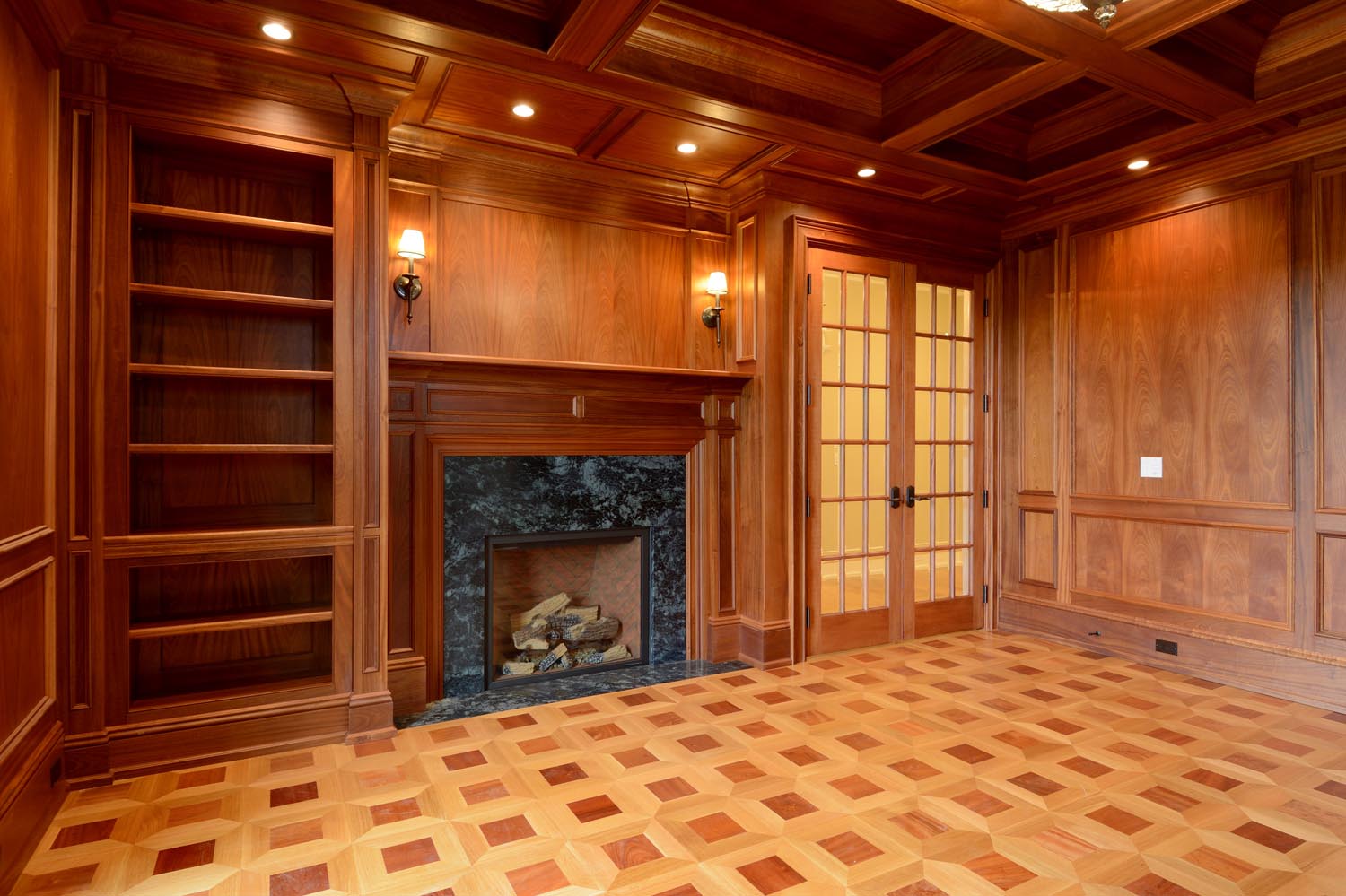
The replica features the Jefferson Library, a collection of rare and antique books according to the same system Jefferson would have used in his own Monticello.
However, Hillsdale and the Blakes didn’t quit on the idea. They decided on a new tact, disingenuous as it was. The school returned with a new proposal for a religious studies center, began calling itself a religious institution — something it had not done with its first plan — and openly threatened to sue under a controversial federal religious anti-discrimination law if the zoning commission said no. The battle lasted nearly two years.
In Michigan, Hillsdale insists it isn’t a religious institution. In Connecticut, they were suddenly insisting they were. The problem with that is that Republicans in Connecticut are not the same as Republicans in, say, Mississippi.
Many people in town viewed the school’s updated characterization of itself as a religious institution — it is not affiliated with a church — as a cynical misrepresentation to get around zoning rules. “My problem all along is when they first arrived in town, they weren’t a religious institution,” says Joe Duffy, who lives near the planned institute. “The longer the process went on, the holier Hillsdale College became.”
Signs sprouted along the road across from Limoncello reading “Not Hillsdale College Here” and “Keep Hall Hill Road Residential,” referring to the road on which the institute would be. Opponents were concentrated in the neighborhood near the project and among the more liberal members of the community, while supporters tended to be the more conservative members of the local GOP.
Who knew all this was going on up in Somers?
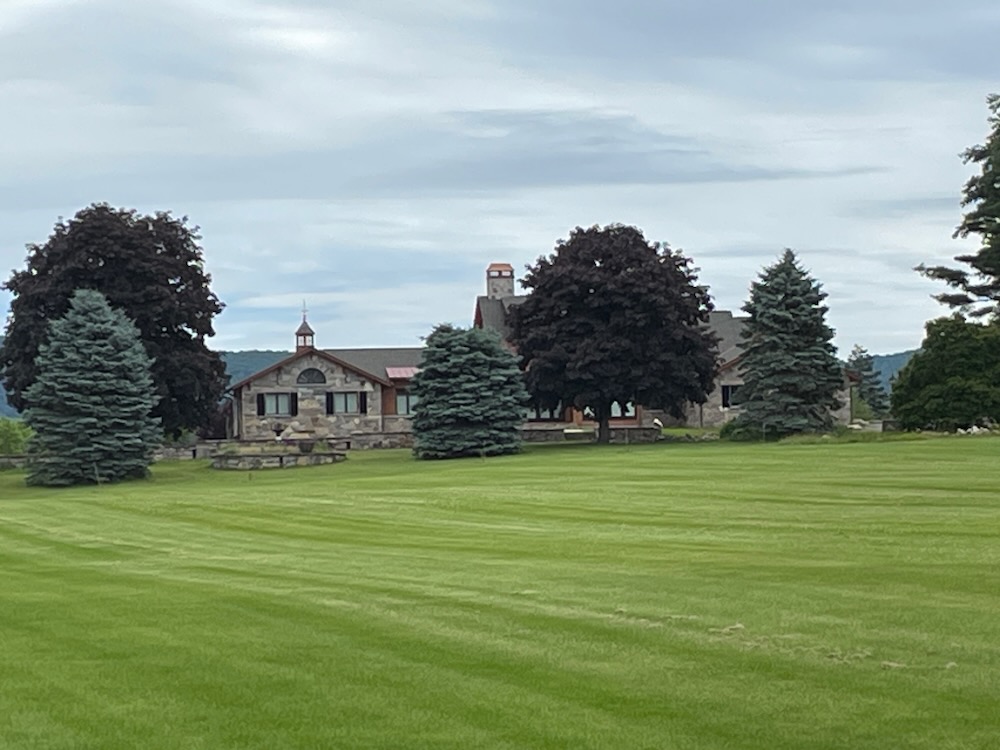
Hillsdale called in a huge legal team, including a high-profile litigator who once clerked for late conservative U.S. Supreme Court Justice Antonin Scalia. They filled town meeting with fancy lawyers. Meanwhile, the Somers town government was overwhelmed. No way could Somers face an expensive lawsuit.
When the commission finally voted to approve the project in mid-July — deliberations were delayed by the COVID-19 shutdown — members did so without comment or debate, unusual for such a contentious application. The approvals included restrictions on use of the Monticello replica — 11 seminars, three lectures and two teacher-training sessions a year with a maximum of 75 guests on the property.
Somers officials won’t even talk about the deal for fear of lawsuits. Hillsdale insists they are and will continue to be a good neighbor – and it seems they are. When I drove by it was quiet and unoccupied. And, quite frankly, attractive. They’ve preserved a large open space and supposedly make it accessible to the public. (Again, I didn’t try.)
Hillsdale’s local supporters have the Christian persecution thing going for them of course. Some local guys said, “I feel a lot of people have come and just tried to attribute some nefarious motive. To what end? What good does it do them? They are not coming here to be a bad neighbor. I think they hold Christian values as part of their makeup. That’s not necessarily a popular thing to be in the United States.”
Yes. That’s it. eyeroll emoji
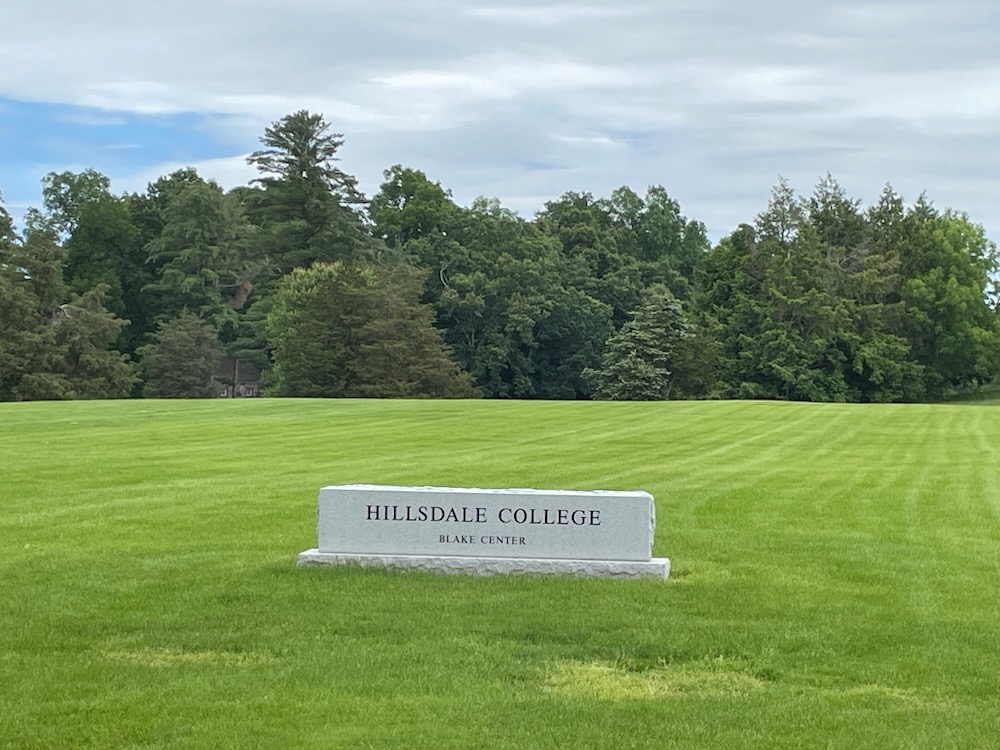
They named the arm of the college The Blake Center for Faith and Freedom and added the official tagline “Maintaining Christianity and Perpetuating Liberty.” And apparently they want “freedom” from paying taxes and “liberty” from keeping promises.
To be clear, this joint doesn’t have to pay taxes because they are an educational facility, not because they are a church. But they used “the church” as the reason to allow the educational facility or else they’d sue Somers on grounds of religious discrimination. So Somers is out the $100,000 in taxes the Blakes had to pay and got strong-armed into allowing this weird little conservative suddenly-Christian college in to house seminars. I think that’s about it.
Hillsdale representatives repeatedly stated publicly that the school or the Blakes would make up the lost revenue, but the town never received anything in writing. Months… years. Just empty promises. Supporters in town kept telling the town to chill, good Christian institutions always make things right. They keep their promises.
That was in 2019.
Hillsdale says that its approximately 1,500 students are held to the highest of ethical and moral standards and constantly exhorted to seek out “the good, the true and the beautiful.”
They hadn’t yet made good on their promise in late 2021.
There’s more to this story, but I’m not going to make anything better than has already been written. So again, I point you to Christopher Hoffman’s work for Connecticut Magazine. (Sorry, there’s some repetition.)
In Hillsdale’s worldview, America went wrong in the early 20th century with the rise of the progressive movement, which sought to address through government the inequities and injustices of the industrial age. In this interpretation, Theodore Roosevelt and especially Woodrow Wilson are among the worst, if not the worst, American presidents, because they were progressives who effectively undermined the Constitution by creating what the school calls an undemocratic and despotic administrative state to address society’s ills.
…
Hillsdale followed up in early 2019 with presentations to various town boards and commissions and public forums at which school officials talked about the school, explained its plans and answered questions. “We think the center can only be successful if it’s in concert with the community and maintaining good relations,” Hillsdale Chief of Staff Mike Harner told a packed crowd at a March 5, 2019, meeting that was recorded and posted on Facebook. That night, Harner promised listeners that the school would find a way to make up the $100,000 tax loss. “We’re going to figure out how to replace it,” he said. “It’s our intention to make sure that gap is addressed.” It was the first of at least four times over the coming year that the school said publicly that it or the Blakes would or would try to make up taxes; the next time by Walsh in a late December memo and again in a statement during the Jan. 6 public hearing — “The Blakes have committed to cover the tax gap either through an annual contribution and/or an endowment,” he said that night — and a final time by Harner, who was paraphrased in a March 5 article in the school newspaper as saying, ”the college would try to replace the lost revenue via direct payment to the town or reimbursement to the community.”
…
But in the fall, Hillsdale returned with a new plan — and a new characterization of itself. When combined, they solved the zoning problem. Now the school was seeking to create the Blake Center for Faith and Freedom, which would focus on seminars and lectures about Christianity. The center would boast a full-time chaplain living on the property and a chapel — a second chapel in the basement of Monticello was later added to the proposal — where religious activities would occur on a regular basis.
In addition, the school began calling itself a Christian institution. That meant, the school’s lawyers argued, it could invoke the federal Religious Land Use and Institutionalized Persons Act (RLUIPA), which is intended to protect churches and religious institutions from discriminatory land-use rules. From the get-go, the school’s lawyers argued that its status as a Christian institution and the religious activity at the chapels, which would not be open to the general public, all but compelled the town’s zoning commission to approve the project because houses of worship and religious institutions are allowed in the zone.
“Hillsdale’s Christian principles animate and characterize all of its activities, and its plans for the Somers properties are no exception,” Walsh, the college’s lead attorney, wrote in a 2019 memo to the commission. “The very name of the place — the Blake Center for Faith and Freedom — affirms that, in Connecticut as in Michigan, the ‘conspicuous aim’ of the college will remain to ‘teach by precept and example the essentials of the Christian faith and religion.’ ”
You hear that? It’s in the name! Just name something in some way and that means it’s true! Brilliant tactic.
That Hillsdale was a religious institution was news to people in Somers. During its meetings with townspeople about its first proposal, school officials had not said that. Asked point blank at the March 2019 town hall what Hillsdale taught, Harner responded, “Individual liberty, personal responsibility, free enterprise and constitutional government.” The claim that the school is a religious institution irked many, who viewed it as an end-run around the town’s zoning rules, to the point that guffaws and murmurs flooded the hearing room when Walsh announced the new proposal at a packed Zoning Commission meeting in early December.
“I was [at earlier hearings] and they didn’t mention anything about religion,” says project opponent Andy Phillips, who as a member of the library board, heard a presentation of the original proposal from a Hillsdale representative. “This didn’t seem very ethical to me. It struck me as a spoiled child who didn’t get what they wanted and changed the rules.”
“They knew that the commission was not going to approve it,” resident Deanise Shewokis says. “So they said, ‘What can we do to get in there?’ They went the route of religion.”
Hillsdale’s former attorney, Keeney, acknowledges that the school changed how it characterized itself — he says he no longer represented them when they made that decision — in order to get its permit, but says the school’s history and curriculum justified the switch. “There’s nothing underhanded about what’s going on,” Keeney says. “The fact that Hillsdale has cloaked itself as a Christian institution is most accurate. That’s what they are, even though that’s not what they said in the beginning.”
Asked by Connecticut Magazine why the school, if it is a Christian institution, didn’t say so from the start, spokeswoman Davis cites the school’s history and repeats arguments it put forth for its second proposal.
Hillsdale’s approach to the town changed from congenial to confrontational. In place of friendly, accommodating school officials like Harner, the school brought in Walsh, a young, fast-rising conservative legal star from Wisconsin who, in addition to clerking for Scalia, was named by Forbes to its “30 Under 30: Law and Policy” list in 2017. Walsh, a Hillsdale graduate, cut his teeth as Wisconsin’s chief deputy solicitor general defending the state’s voter ID and other controversial laws passed during GOP Gov. Scott Walker’s deeply divisive administration. Now in private practice, Ryan earlier this year represented Republicans in the Wisconsin legislature in their successful effort to prevent wider use of absentee ballots in the state’s April primary because of the coronavirus pandemic, an action condemned by Democrats as attempted voter suppression.
Lawsuit threat escalates battle
Walsh, who declined to be interviewed for this story, referring all questions to Hillsdale, wielded RLUIPA like a club throughout the proceeding. What makes the statute especially effective, intimidating and controversial is an unusual provision requiring defendants to pay the plaintiffs’ legal fees if they lose — potentially costing municipalities hundreds of thousands, even millions, of dollars if they unsuccessfully defend denials in court. At the end of January in the midst of the public-hearing process, Walsh threw down the gauntlet. Fearing “decisions adverse to the college” and complaining about questions commissioners and their lawyers were asking, he sent the commission a letter saying the school was preparing to sue it, its members and the town under RLUIPA in both federal and state court and demanding they save all their records and communications. The college retained Detroit lawyer Daniel P. Dalton, who specializes in RLUIPA litigation and attended the Feb. 3 public hearing during which Walsh introduced him to the commission, court records and meeting minutes show.
During one public hearing, Walsh went so far as to imply the commission could not probe the validity of Hillsdale’s position that it is a religious institution — the central issue in the school’s application. Doing so would amount to accusing the college of “perpetrating a fraud,” Walsh said. “I sure hope that is not the suggestion in this proceeding,” he told the commission in a solemn voice. “I hope not, but it sounds like that is the line of inquiry the commission is pursuing. I would ask you, please don’t throw into doubt our sincerely held religious beliefs.”
I’m sorry, this story fascinates me. Up in li’l ol’ Somers! Fancy lawyers for a tiny conservative college accusing the town of accusing them as the frauds they kinda sorta clearly are in this instance. Crazy.
But Marci Hamilton, a University of Pennsylvania professor, attorney and nationally recognized expert on RLUIPA, says it was “ridiculous” for Walsh to have suggested the law prevented the commission from looking into the sincerity of Hillsdale’s claim to be a religious institution.
A leading and longtime critic of RLUIPA who has testified before Congress on the law, Hamilton says the statute’s requirement that municipalities pay applicants’ legal fees if they lose gives religious groups an unfair advantage in getting projects approved, contrary to the intention of the First Amendment. The law, she says, is widely abused to get around local land-use laws and invoked so often that lawyers have built lucrative practices on it.
“This is a money maker,” says Hamilton, who clerked for retired U.S. Supreme Court Justice Sandra Day O’Connor. “Builders and people with projects will go out of their way to try to characterize something as religious in order to get the benefit of RLUIPA. The way it operates is that [applications] go on for years, and the local jurisdictions don’t want to invest millions of dollars in this kind of lawsuit and neither do their insurers. These cases almost always settle in some shape or form.”
Asked to comment on Hamilton’s criticisms of RLUIPA, Hillsdale spokeswoman Davis responded that they did not apply to the school’s Somers application. “Hillsdale is not in a position to speculate about other applications and how they are affected by RLUIPA,” she says.
Davis calls Hamilton’s comments “a rather extreme position and fortunately not the current state of the law in our country.”
Friends in high places
Hillsdale’s uncompromising promotion of conservative ideals has made it a favorite of right-wing businessmen, politicians, journalists and opinion makers. Vice President Pence gave the school’s commencement address in 2018, in which he called it “a beacon of liberty and American ideals,” and made a second appearance there last year. Justice Thomas spoke at the dedication of the school’s chapel last year and was the 2016 commencement speaker, while his wife, Ginni, has served on the school’s board of trustees and for a time ran its Washington, D.C., facility. The billionaire Van Andel family, co-owners and co-founders of the Amway business empire (the school named its new Washington, D.C., graduate school of government after former Amway Chairman Steve Van Andel, who sits on its board) is a major supporter, along with many lesser-known wealthy businessmen.
Amway, beacon of integrity. Ginni Thomas, upholder of the law. Since no one is reading this far down I’ll say it: These are awful people. But there’s more!
The school’s connections reach into the top echelons of the federal government. President Donald Trump reportedly considered school President Arnn for secretary of education before choosing Betsy DeVos, whose family is also an Amway owner and major Hillsdale donor and whose brother, Erik Prince, founder of the controversial private military company Blackwater, attended the school. The school added some star power last year, naming Sajak chairman of its board of trustees.
Hillsdale is hell.
In an illustration of Hillsdale’s pull in D.C., Senate Republicans tried unsuccessfully in 2017 to exempt it from a new federal tax on higher education endowments of $500 million or more. The school has grown even more influential and ambitious during the Trump era, prompting Politico to headline a 2018 article on Hillsdale “The College that Wants to Take Over Washington.” According to press reports, many of its alumni have ended up in Trump’s administration, including speech writers for the president and Pence, and Arnn has openly embraced Trump, a position that has caused some controversy at the school.
Flush with donations, the school is expanding rapidly. In the last 18 months, it has opened the Steve and Amy Van Andel Graduate School of Government in Washington, D.C., dedicated its new chapel, introduced new online courses, including a U.S. history course specifically designed to counter The New York Times’ 1619 Project — in an email to supporterslast spring,Arnn called the Pulitzer Prize-winning series on racism in the U.S. “fake history” — and kicked off a fundraising campaign with a $600 million goal. An aim of the “Four Pillars” campaign, according to co-chairs Sajak and Van Andel, is to further spread the school’s ideas beyond campus.
“Our country needs Hillsdale College now more than ever, which is why Hillsdale has adopted the strategy of radiating what occurs on its campus as far and wide, and to as many citizens, as possible,” the pair say in a statement on the campaign’s website.
The zoning commission repeatedly pressed Hillsdale to be more specific on how it would use the facility, with mixed results. In addition to restricting the number of seminars, lectures and training sessions, the commission required the school to submit a yearly report of activities at the center. Pressed, Walsh at times seemed to suggest that most but not all events would focus on religion, while at other times saying all activity would be religiously related. Asked to clarify, spokeswoman Davis says that the college’s Christian ethos will be “central to” and “imbue” the center, with all events having “explicit and implied religious themes.”
“The Blake Center for Faith and Freedom will extend the college’s educational mission to the Somers community,” she says.
The “great majority” of the center’s training for public and charter school teachers, meanwhile, “will discuss the relationship between regulation and religion in America and the world,” Davis says. Davis did not rule out Hillsdale using the center to market its Barney Charter School Initiative in Connecticut, saying the center “will promote Hillsdale College and its programs broadly.”
Hillsdale, Davis says, “has no plans” to one day turn the center into a campus but instead intends to use it “as described to the community in its proposal.”
Critics will be keeping a close watch, says resident and project critic Levesque. “We’ll see how religious they are,” she says. “I’m sure there will be people that will be watching them, including the zoning board. I have friends who I know are going to be very diligent about it.”
And finally, let’s get back to what initially drew me to this place: Monticello and Jefferson. I know enough about Pres TJ to know that he’d hate this whole operation on principled grounds. It’s an irony apparently completely lost on the Hillsdale crew. Back to the article:
At the first public hearing in December, Walsh called Thomas Jefferson “the man of the hour” and read quotes from him praising Christianity and supporting freedom of religion. “We think it’s particularly appropriate that we use this property, Monticello, in particular, given Thomas Jefferson’s views,” Walsh said.
Hamilton, the RLUIPA expert and critic, strongly disagrees, saying Jefferson would be “turning in his grave” to learn that the law is being used to leverage approval of a religious center in a replica of his home. That’s because Jefferson, she says, believed strongly that religious entities should receive no special treatment from the government, which RLUIPA effectively bestows on them.
Hamilton also points out that Jefferson, while a great admirer of Jesus’ teachings, had highly unconventional views on religion, including rejection of all the miracles in the Bible, such as the Resurrection and the Virgin Birth, something confirmed by John Ragosta, an expert on Jefferson and religion at Monticello in Virginia. “Nobody today or in those days would have considered him a traditional Christian,” Ragosta says. Jefferson spent his later years cutting up the Bible to make his own version sans the miracles, Hamilton notes. The official website for Monticello in Virginia devotes an entire page to what is known as “the Jefferson Bible.”
“The groups that are for RLUIPA, many of them routinely trash Jefferson and the concept of separation of church and state,” Hamilton says. She adds that a religious center in a replica of his home with a chapel in the basement would be “a delicious irony.”
Indeed.
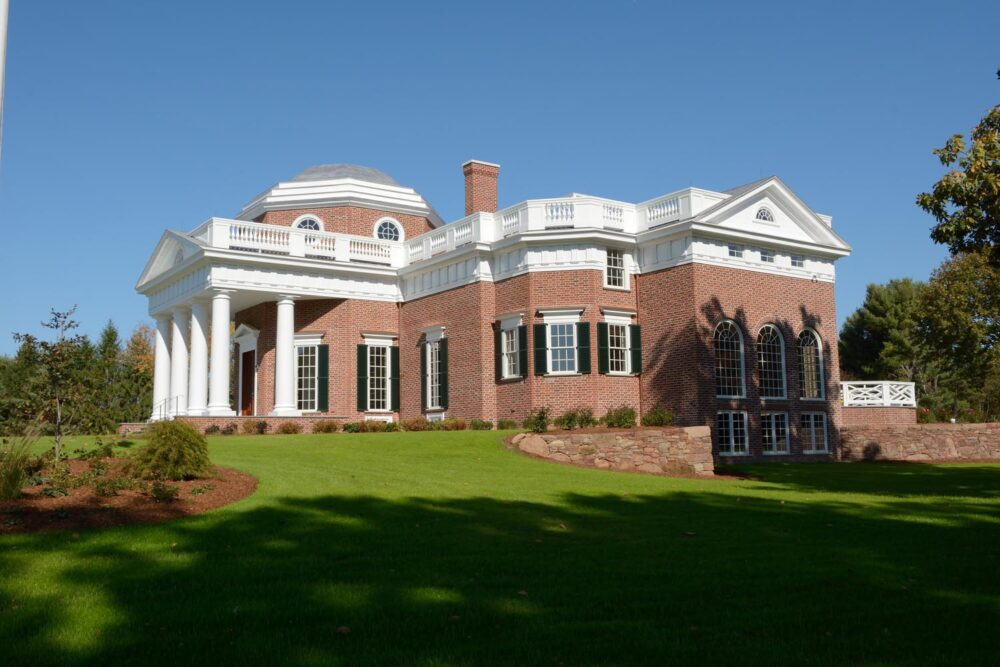
![]()
The Blake Center for Whatever
The article most of this stuff is from
CTMQ’s Houses, Ruins, Communities & Urban Legends
CTMQ’s Cool and Unique Libraries, Post Offices, & Schools
CTMQ’s Churches, Temples, & Random Religious Things

 Peter says
Peter says
January 18, 2024 at 9:56 amIf there’s any consolation, it’s that the facility probably isn’t costing Somers any meaningful amount in terms of municipal services. While there’s the $100,000 in lost revenues things would be about the same as if the land never had been developed and had a much lower tax bill.
 Satoshi says
Satoshi says
November 1, 2025 at 11:04 pmThe tone of this article is totally critical, dropping hints about ties to Trump. About 60% of the country voted for him, it’s a GOOD thing to have ties to Trump.
Obviously the powers in Somers are leftists, and that’s why this whole thing hasn’t been classified as a Museum or something. Does the Blacksmith Shop have to pay these taxes? I bet not. But even if they do, this should be fully exempt from all taxes for life (Can Trump do this?) as a testament to what Great Americans can do and accomplish in this wonderful land.
 Steve says
Steve says
November 2, 2025 at 8:39 amJesus Christ.
64% of eligible voters voted. Only a smidge over half of them voted for Trump. In other words, about 32.5% of the country voted for Trump. How in the world have you got this so wrong?
Oh. Right. You’re a Trump voter.